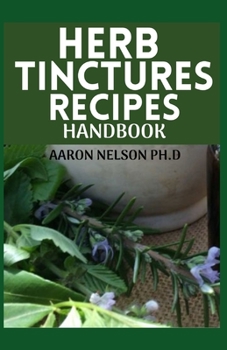Herb Tinctures Recipes Handbook: Your Guide to Healing Common Sicknesses with Various Medicinal Herbs
A taste of herbal tea or a dropperful of color can be the impetus for a long lasting quest for herbalism. A large number of us start our investigations making these straightforward and compelling arrangements, yet essential ideas in some cases become entangled when attempting to decipher Latin binomial nomenclature, formulations, physiological actions, and historical research. The most common mix-ups arise from misused terminology, and one term that tends to be applied to a variety of preparations is tincture.Tinctures are concentrated herbal concentrates that are made utilizing liquor and slashed herbs. The color is particularly viable in drawing out the basic mixes of plants, particularly those that are stringy or woody, and from roots and gums. Since this strategy guarantees that the herbs and their nutrients can be saved for quite a while, it is regularly referenced in herbal books and cures as a favored method of utilizing herbs. Likewise, numerous herbalists love tinctures for other useful reasons, for example, their being anything but difficult to convey, their utility for long haul medications, and their capacity to be ingested quickly, just as considering prompt measurement changes. Too, should the color demonstrate harsh, it's effortlessly added to juice to camouflage the flavor. Another advantage of tinctures is that they keep nutrients from the plants in a steady, solvent structure and they hold the unstable and semi-unpredictable fixings that are in any case lost in heat-treatment and preparing of dry herbal concentrates.
Format:Paperback
Language:English
ISBN:B089TXGNRC
ISBN13:9798652465476
Release Date:January 1
Publisher:Independently Published
Length:64 Pages
Weight:0.19 lbs.
Dimensions:0.1" x 5.5" x 8.5"
Customer Reviews
0 rating





